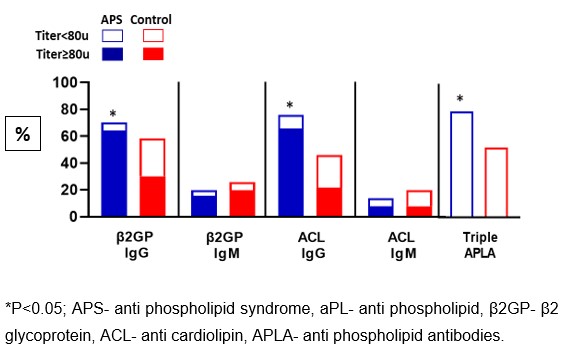Session Information
Session Type: Poster Session A
Session Time: 10:30AM-12:30PM
Background/Purpose: Antiphospholipid syndrome (APS) is a systemic autoimmune disease characterized by arterial, venous or microvascular thrombosis, obstetric morbidity and/or non-thrombotic manifestations. The 2023 ACR/EULAR APS classification criteria incorporated, for the first time, the non-thrombotic manifestations, which are relatively common among the pediatric population. In this paper, we validated the 2023 ACR/EULAR APS classification criteria on the pediatric population and compared them to the 2006 revised Sapporo criteria.
Methods: We collected clinical and laboratory data on pediatric APS patients treated in a single center between the years 2011- 2024. Our control cohort included patients diagnosed with an autoimmune disease and/or anti-phospholipid (aPL) carriers. The gold standard of the diagnosis was expert opinion.
Results: We identified 50 patients diagnosed with pediatric APS. Sixty- two percent had primary APS. The mean age at first manifestation was 18.3 years, mean follow-up duration was 11.68 years. Control cohort had 50 patients, mean age of first manifestation was 15.1 years with a mean follow up of 7.1 years. Forty-nine control were aPL carriers, 26 had lupus and 22 had other autoimmune disease. Forty-eight of the APS patients fulfilled the 2023 classification criteria while 46 fulfilled the 2006 classification criteria, which gives sensitivity of 96% and 92% respectively. None of the controls were positive to neither of the criteria, leading to a specificity of 100%.
Conclusion: In our pediatric APS cohort, the 2023 ACR/EULAR classification criteria were more sensitive than the 2006 classification criteria. Interestingly, the improved sensitivity was due to the more flexible vascular criteria.
To cite this abstract in AMA style:
Bar D, Niznik S, Spielman S, Semo-Oz R, Barg A, Levy-Mendelovich S, Kenet G, Agmon- Levin N, Tirosh I. Validation of the 2023 American College of Rheumatology/European League Against Rheumatism Antiphospholipid Syndrome Classification Criteria in the Pediatric Population [abstract]. Arthritis Rheumatol. 2024; 76 (suppl 9). https://acrabstracts.org/abstract/validation-of-the-2023-american-college-of-rheumatology-european-league-against-rheumatism-antiphospholipid-syndrome-classification-criteria-in-the-pediatric-population/. Accessed .« Back to ACR Convergence 2024
ACR Meeting Abstracts - https://acrabstracts.org/abstract/validation-of-the-2023-american-college-of-rheumatology-european-league-against-rheumatism-antiphospholipid-syndrome-classification-criteria-in-the-pediatric-population/

